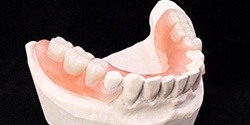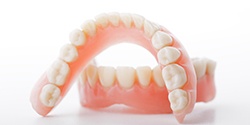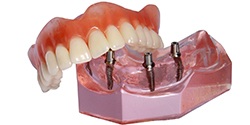Dentures – Denton, TX
Flawless Treatment Options to Keep You Smiling

If you’ve lost numerous teeth, a full row, or you’re fully edentulous (without teeth), the Denton Dental Center can help. Our knowledgeable team of dental experts offers a wide range of tooth replacement options to renew your oral health, allow you to consume a nutritious diet, and give you the ability to speak and smile with confidence once again. Don’t struggle with a less-than-complete smile. Call our state-of-the-art dental office in Denton to schedule your tooth replacement consultation with our dentist. We’ll review your situation and help you to determine what restoration options will work best for you!
Why Choose Denton Dental Center for Dentures?
- State-of-the-Art Dental Office
- Dental Insurance and Flexible Financing
- Commitment to Exceptional Customer Service
Who’s a Good Candidate for Dentures?

Since dentures are incredibly versatile, they can help a wide range of patients! Whether you are missing several teeth in a row, a few throughout your mouth, or you don’t have any left, this tried-and-true tooth-replacement service may be the solution. If you’re interested in finding out if you’re a candidate, we recommend scheduling an appointment with our dedicated Denton dentist, Dr. Balington. That way, he can learn more about your specific dental needs and help you decide what the next best steps are.
Effects of Missing Teeth

There are numerous different causes for tooth loss, and all sorts of risks if you don’t replace them. In most cases, losing teeth is due to tooth decay, gum disease, and injury. According to the American Academy of Periodontology, there are several negative consequences of missing teeth. This includes facial sagging, difficulty speaking, difficulty eating, and lower self-esteem.
When you replace your missing teeth with dentures, you can reduce all of these negative side effects. Ultimately, dentures can help to restore the appearance and function of your teeth, allowing you to speak, eat, and smile with confidence again!
What Qualifies You for Dentures?

Dentures are an ideal option for almost anyone who has experienced significant tooth loss. However, if you are getting dentures, you will need to be willing to properly care for your replacement teeth and the health of your smile. If you have any existing oral health issues, like tooth decay or gum disease, they will need to be treated before you can move forward in the process of getting dentures.
The number of teeth you are missing will ultimately determine which type of denture you will receive. Another amazing thing about dentures is that they are much more affordable than other tooth replacement options, like dental implants. This way, if you aren’t able to invest lots of money in your replacement teeth at this time, you can still show off a beautiful, complete smile!
Alternative Tooth-Replacement Options

Patients who don’t make a good candidate for dentures can explore other options, like dental bridges or implants:
- Dental Bridges: Dental bridges “bridge” the gap where the missing tooth is. A bridge is supported by the adjacent teeth, so it is a good option for patients who are only missing one or a few teeth. This tooth replacement requires healthy surrounding teeth.
- Dental Implants: A dental implant is a titanium post that is inserted into the jawbone. Patients must have a solid bone structure to support the replacement tooth. This option is more costly and requires a surgical procedure, but it is the most stable option and is permanent.
How Dentures are Made

You likely want to learn how dentures are made before trying them. Once you know the design of your new teeth, you can better appreciate them. Even so, finding the relevant denture facts isn’t easy. We at Denton Dental Center are here to remedy that problem. Thus, listed below is a primer on how dental labs make dentures. Please look it over to grasp your prosthetics. From there, you can call us for more details.
What are Dentures Made Of?

No matter its type, every denture has two crucial parts: a base and artificial teeth. These components form the bulk of the restoration. Read on to consider their features:
- Denture Base – The foundational structure that supports a denture’s teeth. Typically, it’s made of acrylic, resin, nylon, or metal. Acrylic is often used for full denture bases, as it’s a plastic that can match your gums. Partial dentures tend to rely on metal clips with an acrylic base.
- Artificial Teeth – The actual tooth-replacing portions of a denture. In most cases, workers craft them from lifelike resin or porcelain. Porcelain is the most popular material due to its realistic looks.
The Denture Creation Process

Since each denture is custom-made for its patient, a dentist follows a multi-step process to make one. The most fundamental of these steps are the following:
- Step 1: Dr. Balington will take a dental impression. From there, he’ll make a plaster model that matches the final denture’s size and shape.
- Step 2: Our office will send the plaster model to a lab. Next, lab workers will use it to create a wax gumline.
- Step 3: The lab will set artificial teeth in the wax base. This step leads to a prototype denture, which will be used to make the final one.
- Step 4: The wax denture will go to the dentist for a fitting. After testing, it’ll return to the dental lab to finish the final restorations.
- Step 5: After boiling the denture to remove its wax, a worker will place it in a flask. This flask will receive plaster and sit in hot water.
- Step 6: A separator will go into the plaster layer, ensuring the acrylic doesn’t stick. This latter material will be injected into the flask to replace the wax.
- Step 7: The plaster will be removed to reveal the denture. Later, the restoration will be placed in a bath to remove residue.
- Step 8: The worker will cut excess acrylic from the denture. Said denture will then be polished.
- Step 9: The patient will have the denture fitted. At that time, the dentist will adjust your denture to work smoothly.
Adjusting to Your New Dentures

As you begin using dentures, your mouth may ache a little. It could even feel soreness or struggle to eat and speak. Still, don’t panic – these effects are normal and fade with time. Once the dentures are more familiar, they’ll feel like your other teeth.
If necessary, you can speed up the adjustment process. One way is to exercise your facial muscles. Alternatively, you could try eating soft foods for a week. Keeping your dentures in place with adhesive will also help. Whichever approach you pick, your dentures should feel natural in less time.
Lastly, please call our office if your aches persist or get severe. Your dentures themselves may need adjusting.
Types of Dentures

At Denton Dental Center, we can help patients with all stages of tooth loss. In fact, we offer three different types of dentures: partial, full, and implant-retained. You can learn a bit more about each right here to help you get a better idea of which one is best for you!
Partial Dentures

Partial dentures are often referred to simply as partials. These complex tooth replacement prosthetics are made up of a gum-colored base material that supports numerous tooth-colored replacement teeth, filling gaps in your smile. Partials can be used to replace any number of consecutive and nonconsecutive missing teeth. Your partial will be held in place by clasps attached to surrounding healthy teeth.
Full Dentures

To replace an entire row of teeth, we’ll custom-make a full denture. Like partials, full dentures are made up of a gum-colored base material that supports replacement teeth. Because there are no remaining teeth to anchor the prosthetic, dentures are molded to fit against the gum line. The snug fit creates suction that holds the denture in place. Some people also use denture adhesive to improve stability.
Implant Dentures

Dental implants are small, titanium posts that anchor replacement teeth in position. While traditional dentures rely on healthy remaining teeth or your gum line for support, an implant-retained prosthetic will be fully self-supporting, providing additional stability and longevity for the denture and improved overall oral health and dental function for you.
Tips for New Denture Wearers

When you first get your new set of partial or full dentures, especially the removable variety, you’ll need to take some time to get used to the way they look and feel. As you adjust to your tooth replacement prosthetic, you may experience some discomfort, but if you’re still experiencing pain or swelling after the first week or two with your new denture, call our office. We may need to have your prosthetic refitted. The following tips can help you get used to your new denture more quickly, so you can speak, chew, and smile with confidence once more:
- Try singing with your denture in place. It sounds silly, but many denture wearers swear by this unique method of improving speech clarity.
- Don’t bite right into a steak – work your way up. It helps to know your limits when it comes to chewing coarse or difficult foods. Start with soft foods. Then, gradually increase the difficulty of chewing when you’re comfortable.
- Keep your denture (and any remaining teeth) clean. You should brush your denture just like you would your healthy smile. If you have a removable prosthetic, store it in water or cleaning solution overnight. Make sure to brush and floss natural teeth daily, and don’t forget to schedule your six-month dental exams.
The Benefits of Dentures

If you’re missing multiple teeth, you may have difficulty with day-to-day tasks such as eating, speaking clearly, and smiling confidently. Luckily, dentures have allowed millions of patients to change their lives with lifelike dental restorations. Whether you are missing one, a few, or many teeth, dentures can give your smile another chance while delivering significant benefits for your oral, psychological, and overall health. Read on to learn how Dr. Balington can give you dentures that will help you be excited to smile again.
Psychological Benefits

The loss of many or all of your teeth can take a significant toll on your self-esteem and your social life while also making you more likely to experience sadness and depression. This can make you less likely to engage in social activities, which can lead to loneliness and frustration. Using dentures to restore the appearance and function of your smile can greatly bolster your self-image, making it much easier to enjoy the spotlight and life in general.
Clearer Enunciation

Tooth loss can make it more difficult to pronounce certain sounds by changing the way air flows through the mouth. Since dentures occupy the space left by your missing teeth, they can make it much easier to speak clearly. While it may take some time to get used to speaking with them, it will only get easier as you get more practice, and you can help this process along by reading a favorite book out loud while repeating any words that give you trouble.
Improves Nutrition

Many foods that are rich in nutrients have a tough or fibrous texture, making them harder to eat if you don’t have all of your teeth. Having to forgo tasty foods like raw veggies, crisp fruits, and meaty proteins can take its toll on your nutritional intake. By replacing your lost teeth, dentures can allow you to consume a wider variety of the healthy foods your body needs to stay in great shape.
Preserves Oral Health

If you have any natural teeth remaining, dentures may be able to help keep them healthy. Wearing dentures can help stabilize these teeth, preventing them from shifting out of alignment while also bearing some of the pressure of chewing. This can reduce the likelihood of your remaining teeth becoming injured or infected.
Expands Opportunities

Some studies have found that poor oral health may make it harder to find a job. Since your smile is one of the first things that other people notice about you, having teeth you can be proud of can be a major asset in the pursuit of employment opportunities or promotions. Wearing dentures can give you the confidence you need to make an ideal first impression, providing you with a tremendous advantage over the competition.
Understanding the Cost of Dentures

While you may want dentures, it’s best to learn their price first. (You can’t buy the prosthetic teeth if they exceed your budget.) That said, the cost of dentures varies from patient to patient. You’ll need to consult Dr. Balington for a precise estimate. Once you have, our dental team will work to make your dentures more affordable. We’ll thus walk you through the treatment’s cost factors and payment options. For more details, just keep reading or call our office.
Factors That Affect the Cost of Dentures

You’ll undergo an oral exam at the start of treatment. At this point, Dr. Balington will review the factors affecting your dentures’ cost. These generally include:
- Preparatory Work – Given your oral health, you may need preliminary services before you get dentures. (These can include tooth removal, gum disease therapy, etc.) Your treatment costs will rise if you require such things.
- Acrylic Base Type – Denture bases can use varying kinds of acrylic. The type used will affect whether your dentures cost more or less.
- Replacement Teeth Material – A denture’s artificial teeth are either acrylic or porcelain. When they’re acrylic, they tend to be cheap but short-lived. In contrast, porcelain teeth can get pricey but last longer.
Besides the points above, note that cheap dentures aren’t good. These sorts often rely on inferior acrylic and bad tooth materials. So, make sure your chosen dentures are of high quality.
Are Implant Dentures More Expensive?

Implant dentures cost more upfront than regular ones do. However, these restorations have perks that make their price worthwhile.
You see, implant dentures make use of dental implants. The latter objects are set in your jaw and slowly fuse with it over time. From there, they’ll ensure your denture stays secure and won’t slip or fall. The result is a lifelike grin that blends with your other teeth.
At the same time, an implant denture pays off over time. Its implants can last for 30 years or more with proper care. As a result, the whole device has a longer lifespan than other options. (A regular denture only lasts for 5-7 years.) That means an implant denture doesn’t need as many repair or replacement visits. It’ll save you money in the long run.
Does Dental Insurance Cover Dentures?

Thankfully, dental insurance will often cover dentures. Most plans see the prosthetics as medically necessary for tooth loss. Given that fact, they typically cover up to 50% of a denture’s cost.
Of course, there are exceptions to this rule. Your dental plan may have limited denture coverage or none at all. So, try to confirm your benefits before treatment. Our dental team is happy to help you do so.
Other Options for Making Dentures Affordable

Aside from insurance, other methods can make dentures affordable. The best of these are a practice’s payment options. If you select a good one, your final dentures can be budget-friendly.
For instance, just look at Denton Dental Center. We happen to offer flexible financing through CareCredit – a reputable, third-party financier. By working with them, you could pay for dentures in monthly installments. You’d then meet the treatment’s cost over time.
Ultimately, our dental team wants your dentures to be effective and affordable. Learn how best to finance them by visiting our office soon!
Dentures Aftercare

Your dentures have the potential to enhance your quality of life for years to come. However, they will only serve you well if you take care of them. For example, you should make it your aim to visit us at least twice a year for a cleaning and checkup. At these appointments we can look for early signs of problems with your mouth and your prosthetic. When we provide appropriate care, you can prevent major problems down the road!
What else should you do to care for your dentures and your smile? Here are some practical tips:
Removable Dentures

Remove After Eating
Try to remember to remove your dentures after each meal so you can thoroughly rinse them. This can prevent plaque, food particles, and bacteria from accumulating both on your prosthetic and your gums. Therefore, you can avoid issues like bad breath and infections. When you rinse your dentures, be sure to use cold or lukewarm water (hot water could warp your prosthetic and cause it to lose its fit.
Clean Your Restoration
You should adhere to a thorough daily cleaning routine for your dentures. Take them out of your mouth and use a soft-bristled toothbrush, along with clear soap or denture cleanser, to gently clean all of your dentures’ surfaces. (Do not use regular toothpaste — it is too abrasive!) If you will not wear your dentures again right away, place them in a glass of water or denture-soaking solution so they do not dry out and lose their shape.
Keep Your Dentures Safe
To protect your dentures from unexpected damage, you should:
- Remove your dentures only when you are standing over a soft surface, such as a folded towel or a sink full of water. If you accidentally drop them, you want them to have an easy landing!
- Store your dentures in a place where it will not be easy for curious pets or small children to get ahold of them.
Remove When You Sleep
While it might be tempting to sleep while wearing your dentures, that is not a good idea. Removing your dentures at night gives your gums a chance to breathe and encourages proper circulation, which can reduce your risk of irritation and infections. It also allows you the opportunity to thoroughly clean both your prosthetic and your oral tissues. When you take your dentures out, be sure to store them in water or a denture-soaking solution.
Notice Changes
You should carefully monitor both the state of your dentures and your oral health. Here are some signs that you might need to see a dentist:
- Your dentures no longer fit well.
- Your dentures have visible signs of damage.
- You are experiencing oral pain or have noticed signs of an infection.
Our team will do all we can to provide appropriate treatment and allow you to continue enjoying your dentures.
All-on-4 Dentures

All-on-4 dentures are different from traditional ones because they are permanently fixed in the mouth. Therefore, many of the best practices that apply to natural teeth also hold true for All-on-4. For example, you should brush twice a day with a soft toothbrush and non-abrasive toothpaste. You should also floss daily, including flossing beneath your denture. A water flosser can help with this, or you can use a small sulcus brush to keep the area beneath your denture clean. It may also be wise to regularly rinse with an antibacterial mouthwash at least once a day.
Dentures FAQs

Are you still second-guessing whether you should get dentures in Denton? Even after reading all of the information laid out above, you might still have some questions about the treatment and what you can expect afterwards. That’s why, for your convenience, we have taken the liberty of answering some of the questions we get asked the most often about dentures.
CAN I SLEEP IN MY DENTURES?
While it’s perfectly possible to wear your dentures at night, we highly recommend taking them out before you head off to bed. Doing so will give your gums and jawbone a chance to rest after withstanding the pressure of holding the dentures in place all day. It also gives you a chance to let your dentures soak in water to keep them clean. You should never let 24 hours pass by without cleaning your dentures.
HOW OFTEN DO I NEED TO SEE MY DENTIST WHEN I HAVE DENTURES?
You might think that once you have dentures, you don’t need to see your dentist in Denton anymore, especially if you have no remaining teeth. However, that is not the case. We still greatly suggest that you see us as often as you did when you had all of your natural teeth, which is every six months. While you may not have as many teeth to get professionally cleaned, these appointments are still an important part of maintaining excellent oral health. We can examine your jawbone and gum tissue for any problems, such as infection, early enough that treatment is still relatively easy.
DOES IT HURT TO GET DENTURES?
When you’re first fitted for dentures, it’s perfectly normal to experience some minor soreness and irritation in your gums. This should fade away after a few weeks as your mouth gets used to your new teeth. The length of this period of discomfort varies from person to person. For example, if you have had to get some teeth extracted to make room for your dentures, the extraction sites may be sore for a while as the gum tissue heals.
HOW DO I KNOW WHEN IT’S TIME TO RELINE MY DENTURES?
If your dentures feel too loose or generally don’t fit as well as they once did, it may be time for a procedure done to the base of the dentures, known as a “reline.” Check with us to see whether your dentures can be relined or simply need to be replaced. It’s best to avoid trying to reline your dentures yourself with over-the-counter kits, as that could permanently damage your dentures. This procedure, when properly done by us, will allow your dentures to have a tighter, more secure fit.
